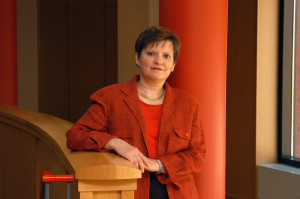Editor’s note: We invited Lawrence alumni who have gone into library work to share with us what they do and how they got there. Here’s another in a series.

From liberal arts context to a research institution in 40 years… my career has been an interesting journey, reflecting some of the seismic changes in information, publishing, and technology. I wish I could convey that I heard a clear call to librarianship when I graduated from Lawrence in 1972 with an English major (and good liberal arts education). Rather, an older sister (also English major) was a librarian with Time Warner in New York, and her experiences helping with research for reporters around the globe sounded appealing. Perhaps, too, the focus on sound skills in inquiry and writing that Lawrence embraced had an impact in selecting a career path. Diploma in hand, I headed to UW-Madison for its library science masters program.
A year later, post-UW grad school, found me working at the University of Minnesota in the South Asian Library, unprepared for the diverse languages and narrow focus. Since academic librarianship seemed an interesting arena, I returned to graduate school in psychology at the University of Minnesota, considering a future as a psychology specialist within a university library. The next stages of my career took me first to another small liberal arts college (Wheaton College in Massachusetts) and then to Brown University Library, where I developed collections and supported faculty in social science disciplines.
A recruitment call from University of Michigan launched the research university chapter in my career and introduced me to university administration, first as an Assistant to the University Library Director (an intern type role) and later as Director of the Graduate (main) Library. In the early 1990’s when campuses were wrestling with the early promise of distributed computing, I had the unique opportunity to launch a fledgling digital library program, an endeavor to seize the opportunities that technology afforded for information delivery and for developing digital content and programs. It was a heady time, and Michigan took an early lead in the international arena of digital information initiatives. Projects ensued to digitize books and journals, create retrieval systems, address diverse needs ranging from art images to biological specimen collections, and much more — often in partnership with other institutions and fueled by many grants. Concurrently, the commercial publishing world began to dramatically step up its development of digital publication, and I oversaw the policy, infrastructure, and service dimensions of acquiring and delivering digital content at Michigan. The experience was expansive and challenging and brought national recognition for our pioneering work.
In 2002, I headed to another U of M, back to University of Minnesota as University Librarian and McKnight Presidential Professor, overseeing a system of 14 libraries, historically rich collections, and a very large distributed staff. Here, too, the burgeoning digital environment grew dramatically, and we’ve been recognized for innovative technology programs and service models that support digital data intensive research and learning/teaching that employs online digital content and tools.
An increasing imperative for academic libraries is to work collectively with other institutions to realize models to share resources and to gain efficiency in serving our individual campuses. I’ve been deeply engaged in these trends within the Big 10 academic consortium known as the Committee on Institutional Cooperation (CIC) and more broadly. I’ve been privileged, too, to serve on various national boards: the Council on Library and Information Resources, the Digital Library Federation, the HathiTrust, and Association of Research Libraries. All of these organizations address the knowledge environment writ large – that is, far more than physical collections and place-based services that used to define bricks and mortar libraries.
Back in the 1970’s when I left Lawrence, could I imagine leading a large library organization and working within complex consortia to address mutual interests? The answer is quite simply, no. Yet, I believe the investments made in those years at Lawrence to nurture a strong liberal arts background, to gain perspective on social issues, and to imagine roles of global citizenship provided an energizing start to a career in the “knowledge business.” I consider libraries a critical player in the knowledge environment of higher education, and I’ve been fortunate to be engaged in leadership roles within that context.
Wendy Pradt Lougee
University Librarian
McKnight Presidential Professor
University of Minnesota